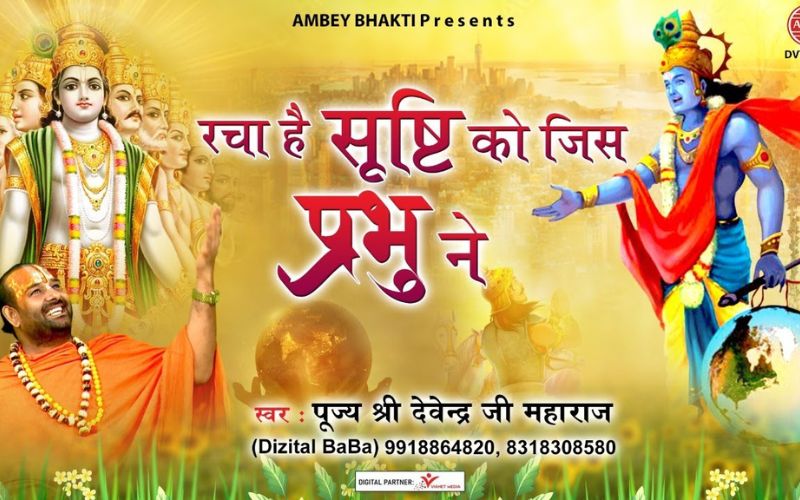“Racha Hai Srishti Ko Jis Prabhu Ne” is a deeply devotional and introspective song that has captivated the hearts of millions across the Indian subcontinent. This timeless devotional hymn, penned by the revered spiritual poet Shri Ramakrishna Paramhansa, is a profound exploration of the divine creation and the omnipotent presence of the Almighty. The lyrics of this song resonate with a sense of wonder, reverence, and deep spiritual connection, inviting listeners to embark on a journey of self-discovery and divine contemplation.
The title of the song, “Racha Hai Srishti Ko Jis Prabhu Ne,” translates to “The Lord who has created this universe.” This simple yet powerful phrase encapsulates the essence of the song, which is a celebration of the divine creator and the marvels of the universe he has brought into existence. Through these lyrics, the poet invites us to contemplate the vastness and complexity of the creation, and to recognize the profound presence of the divine in every aspect of our lives.
Understanding the meaning behind the lyrics
The lyrics of “Racha Hai Srishti Ko Jis Prabhu Ne” are a tapestry of profound spiritual insights, poetic imagery, and devotional fervor. Each line of the song is imbued with layers of meaning, inviting the listener to delve deeper and uncover the hidden depths of the divine message.
The opening lines of the song, “Racha Hai Srishti Ko Jis Prabhu Ne, Uska Naam Hai Govardhan” (The Lord who has created this universe, His name is Govardhan), immediately establish the central theme of the song – the recognition of the divine creator and the power of his name. The reference to “Govardhan” is a nod to the Hindu deity Krishna, who is believed to have lifted the Govardhan Hill to protect the people of Vrindavan from the wrath of the rain god, Indra.
As the song progresses, the lyrics explore the vastness and complexity of the divine creation, with lines like “Jiske Sansaar Mein Sab Kuch Hai, Uska Naam Hai Govardhan” (In whose universe, everything exists, His name is Govardhan) and “Jiske Srishti Mein Sab Kuch Hai, Uska Naam Hai Govardhan” (In whose creation, everything exists, His name is Govardhan). These lines invite the listener to contemplate the omnipresence and omnipotence of the divine, whose name and presence permeate every aspect of the universe.
Significance of the lyrics in religious context
The lyrics of “Racha Hai Srishti Ko Jis Prabhu Ne” hold deep significance within the Hindu religious and spiritual tradition. The song’s focus on the divine creator and the marvels of the universe resonates with the core beliefs and teachings of Hinduism, which emphasize the existence of a supreme, all-encompassing divine force that is the source of all creation.
In the Hindu tradition, the concept of the divine creator, or “Prabhu,” is central to the understanding of the universe and the individual’s relationship with the divine. The lyrics of this song reflect this belief, recognizing the Almighty as the architect of the entire creation and the ultimate source of all that exists.
Moreover, the invocation of the name “Govardhan” in the lyrics is a direct reference to the Hindu deity Krishna, who is revered as an avatar of the supreme divine. This connection to the Hindu pantheon and the rich tapestry of Hindu mythology further enhances the religious significance of the song, making it a beloved devotional piece among Hindu devotees.
Analysis of the poetic elements used in the song
The lyrics of “Racha Hai Srishti Ko Jis Prabhu Ne” are a testament to the poetic mastery of Shri Ramakrishna Paramhansa, the revered spiritual poet who composed this timeless devotional hymn. The song is a masterful blend of powerful imagery, evocative language, and a rhythmic cadence that captivates the listener from the very first line.
One of the most striking poetic elements in the song is the use of repetition, as evidenced in the recurring phrase “Uska Naam Hai Govardhan” (His name is Govardhan). This repetition serves to reinforce the central theme of the song, emphasizing the divine name and its significance in the context of the creation. The repetition also creates a sense of musical and emotional resonance, drawing the listener deeper into the devotional experience.
Another notable poetic device employed in the lyrics is the use of metaphor and analogy. The lines “Jiske Sansaar Mein Sab Kuch Hai, Uska Naam Hai Govardhan” and “Jiske Srishti Mein Sab Kuch Hai, Uska Naam Hai Govardhan” use the metaphor of the divine name to represent the omnipresence and omnipotence of the divine creator. This poetic technique helps to convey complex spiritual concepts in a vivid and accessible manner, making the lyrics resonate with the listener on a deeper level.
The rhythmic structure of the song, with its melodic cadence and distinct meter, also contributes to its poetic appeal. The lyrics flow seamlessly, creating a sense of musical and emotional harmony that enhances the devotional experience for the listener.
Popular renditions and interpretations of the song
“Racha Hai Srishti Ko Jis Prabhu Ne” has been a beloved devotional song for generations, and has inspired numerous renditions and interpretations by renowned artists and musicians across India. From classical Hindustani and Carnatic vocalists to contemporary devotional singers, the song has been performed and recorded in a variety of styles, each bringing a unique perspective and emotional depth to the lyrics.
One of the most popular and acclaimed renditions of the song is by the legendary Pandit Bhimsen Joshi, whose powerful and emotive vocals have captivated audiences for decades. Joshi’s interpretation of the song is marked by his virtuosic command of classical Indian music, as well as his profound understanding of the spiritual and devotional underpinnings of the lyrics.
Another notable rendition is by the renowned Carnatic vocalist Dr. L. Shankar, whose soulful and nuanced performance highlights the poetic beauty and devotional fervor of the lyrics. Shankar’s interpretation is particularly revered for its ability to transport the listener to a realm of deep contemplation and spiritual connection.
In addition to these classical interpretations, the song has also been performed by contemporary devotional artists, who have brought a fresh and innovative approach to the traditional composition. These renditions, often featuring contemporary musical arrangements and production techniques, have helped to introduce the timeless lyrics of “Racha Hai Srishti Ko Jis Prabhu Ne” to a new generation of listeners.
Impact of the lyrics on listeners and devotees
The lyrics of “Racha Hai Srishti Ko Jis Prabhu Ne” have had a profound and lasting impact on the hearts and minds of listeners and devotees across India and beyond. The song’s ability to evoke a deep sense of wonder, reverence, and spiritual connection has made it a cherished and beloved devotional piece among Hindu practitioners and seekers of divine truth.
For many devotees, the lyrics of the song serve as a powerful reminder of the omnipresence and omnipotence of the divine creator. The repeated invocation of the divine name, “Govardhan,” resonates with the listener’s own spiritual journey, inspiring a deeper connection to the divine and a renewed sense of purpose and devotion.
The poetic imagery and metaphorical language used in the lyrics also play a crucial role in the song’s impact on the listener. The vivid descriptions of the divine creation and the profound presence of the Almighty within it evoke a sense of awe and wonder, prompting the listener to pause and reflect on the mysteries of the universe and their own place within it.
Furthermore, the rhythmic and melodic qualities of the song have a profound effect on the listener’s emotional and spiritual experience. The captivating cadence and the emotive power of the vocals have the ability to transport the listener to a state of deep contemplation and devotion, fostering a profound sense of connection to the divine and the universal truths it represents.
Exploring the cultural and historical background of the song
“Racha Hai Srishti Ko Jis Prabhu Ne” is a product of the rich and diverse cultural and spiritual heritage of India, drawing inspiration from the timeless traditions of Hindu devotional poetry and music. The song’s origins can be traced back to the late 19th century, when it was composed by the revered spiritual leader and poet, Shri Ramakrishna Paramhansa.
Shri Ramakrishna Paramhansa was a renowned Hindu mystic and spiritual teacher, whose teachings and writings have had a profound impact on the spiritual landscape of India. His devotional poetry, including the lyrics of “Racha Hai Srishti Ko Jis Prabhu Ne,” is widely regarded as a testament to his deep spiritual insights and his unwavering devotion to the divine.
The cultural and historical context in which the song was composed is also significant. The late 19th century was a period of significant social and religious reform in India, as the country grappled with the challenges of modernization and the influx of Western influences. In this climate, the devotional poetry of Shri Ramakrishna Paramhansa served as a powerful counterpoint, affirming the enduring relevance and importance of traditional Hindu spiritual and cultural values.
The song’s enduring popularity and widespread appeal can also be attributed to its ability to transcend cultural and linguistic barriers. The universal themes of divine creation, devotion, and spiritual contemplation that are woven into the lyrics have resonated with listeners across India and beyond, making “Racha Hai Srishti Ko Jis Prabhu Ne” a truly timeless and culturally significant devotional work.
Translating the lyrics for non-native speakers
For non-native speakers of Hindi or other Indian languages, the lyrics of “Racha Hai Srishti Ko Jis Prabhu Ne” may present a significant linguistic and cultural barrier. However, the profound spiritual and poetic beauty of the song can be unlocked through careful translation and cultural contextualization.
One of the key challenges in translating the lyrics is the inherent complexity and nuance of the language used. The song’s reliance on metaphor, imagery, and cultural references can make it difficult for non-native speakers to fully grasp the deeper meanings and implications of the lyrics. To overcome this, translators must not only provide accurate word-for-word translations, but also offer detailed explanations and cultural context to help the listener understand the deeper spiritual significance of the song.
Another important aspect of translating the lyrics is the preservation of the song’s poetic and rhythmic qualities. The captivating cadence and melodic structure of the original Hindi version are integral to the listener’s emotional and spiritual experience. Translators must strive to recreate this sense of musical and poetic beauty in the target language, ensuring that the translated lyrics retain the same emotive power and devotional resonance as the original.
By carefully navigating the linguistic and cultural complexities of the song, translators can open the door to a deeper understanding and appreciation of “Racha Hai Srishti Ko Jis Prabhu Ne” for non-native speakers. This not only enhances the accessibility of the song but also fosters a greater appreciation for the rich cultural and spiritual heritage that it represents.
How the lyrics resonate with different generations
The enduring appeal of “Racha Hai Srishti Ko Jis Prabhu Ne” can be attributed, in part, to its ability to resonate with listeners of all ages and backgrounds. The song’s timeless themes of divine creation, devotion, and spiritual contemplation have the power to transcend generational divides, speaking to the universal human experience of seeking connection with the divine.
For younger generations, the lyrics of “Racha Hai Srishti Ko Jis Prabhu Ne” can serve as a powerful gateway to the rich tapestry of Hindu spiritual and cultural traditions. The song’s ability to evoke a sense of wonder and reverence towards the divine creation can inspire a newfound curiosity and appreciation for the deeper philosophical and spiritual underpinnings of Hinduism.
Moreover, the song’s poetic and musical qualities can also resonate with younger listeners, who may be drawn to the captivating rhythms and emotive vocal performances that have made the song a beloved classic. This cross-generational appeal can help to bridge the gap between traditional and contemporary spiritual and cultural expressions, fostering a greater sense of unity and continuity within the Hindu community.
For older generations, the lyrics of “Racha Hai Srishti Ko Jis Prabhu Ne” can serve as a cherished touchstone, evoking memories of a lifetime of devotion and spiritual growth. The song’s ability to transport the listener to a realm of deep contemplation and divine connection can be particularly meaningful for those who have dedicated their lives to the pursuit of spiritual enlightenment.
Ultimately, the timeless and universal appeal of “Racha Hai Srishti Ko Jis Prabhu Ne” lies in its ability to speak to the fundamental human need for spiritual fulfillment and divine connection. Regardless of age or background, the song’s profound lyrics and emotive power can inspire a sense of wonder, reverence, and devotion that transcends the boundaries of time and culture.
Conclusion
The lyrics of “Racha Hai Srishti Ko Jis Prabhu Ne” have stood the test of time, captivating the hearts and minds of devotees and listeners across generations. This timeless devotional hymn, composed by the revered spiritual poet Shri Ramakrishna Paramhansa, is a testament to the enduring power of the divine and the beauty of the natural world he has created.
Through its profound exploration of the divine creator and the marvels of the universe, the song invites the listener to embark on a journey of spiritual contemplation and devotion. The lyrics’ ability to evoke a sense of wonder, reverence, and deep connection to the divine has made “Racha Hai Srishti Ko Jis Prabhu Ne” a beloved and cherished devotional work within the Hindu tradition.
The song’s impact on listeners and devotees is multifaceted, resonating with individuals of all ages and backgrounds. For some, the lyrics serve as a powerful reminder of the omnipresence and omnipotence of the divine, inspiring a deeper commitment to spiritual growth and devotion. For others, the song’s poetic beauty and emotive power transport them to a realm of deep contemplation and divine connection, fostering a profound sense of meaning and purpose.
As the world continues to evolve and change, the enduring appeal of “Racha Hai Srishti Ko Jis Prabhu Ne” stands as a testament to the timeless and universal truths that lie at the heart of the Hindu spiritual tradition. Through its ability to transcend linguistic and cultural barriers, the song has become a beloved and cherished devotional work, inspiring and uplifting listeners across the globe.
Discover the profound spiritual insights and poetic beauty of “Racha Hai Srishti Ko Jis Prabhu Ne” by exploring our collection of devotional music and literature. Immerse yourself in the timeless wisdom and devotion that have made this song a beloved classic among Hindu devotees.





